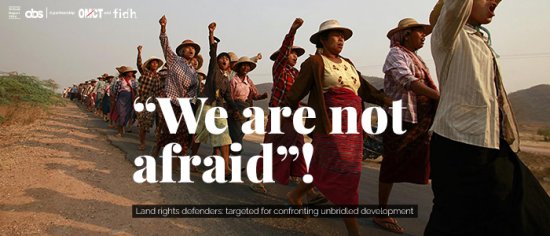New report on land rights defenders
Publish Date:
Thursday, February 12, 2015
Land rights defenders are increasingly the target of repressive measures, says the Observatory for the Protection of Human Rights Defenders in a new report published in The Philippines, Mexico, and South Africa, and which was presented in Geneva at the United Nations Annual Forum on Business and Human Rights. The pressure on land has become unbearable and mobilisation for the respect of the economic, social and cultural rights of affected communities has become a high risk activity.
“This Report shows the daily struggle conducted by land rights defenders, often confronted to “economic predators” greedily supportive of unbridled development. Land rights defenders often live in isolated areas, far from actors of protection. These factors facilitate acts of violence against them, the level of violence being proportional to sky-rocketing profits”, declared Karim Lahidji, FIDH President.

Between 2011 and 2014, the Observatory documented 43 assassination cases targeting land rights defenders and the judicial harassment of 123 defenders, sometimes together with their arbitrary detention. These figures only reflect a small fraction of the real picture. All regions in the world are concerned, Asia and Latin America being the most affected.
The Observatory found that authors of repression are often the police, the military, private security agents and “henchmen”. Their objective being to silence dissenting voices likely to slow down investment projects.
In addition to violence, numerous States also use judicial harassment and arbitrary detention to intimidate defenders. Thanks to laws that violate fundamental freedoms or in violation of their own laws, they jail any person deemed to be a nuisance. “Terrorism”, “misleading propaganda”, “infringement to State security”, “public unrest”, there are many abusive charges which can result in heavy prison terms.
Land rights defenders are often powerless when they face physical attacks and arbitrary arrests. According to the Observatory, 95% of violations against them remain unpunished today.
The Observatory found that authors of repression are often the police, the military, private security agents and “henchmen”. Their objective being to silence dissenting voices likely to slow down investment projects.
In addition to violence, numerous States also use judicial harassment and arbitrary detention to intimidate defenders. Thanks to laws that violate fundamental freedoms or in violation of their own laws, they jail any person deemed to be a nuisance. “Terrorism”, “misleading propaganda”, “infringement to State security”, “public unrest”, there are many abusive charges which can result in heavy prison terms.
Land rights defenders are often powerless when they face physical attacks and arbitrary arrests. According to the Observatory, 95% of violations against them remain unpunished today.
Judicial bodies in countries where such violations occur are characterised by a lack of independence, resources and expertise. Regarding the possibility of prosecuting business corporations responsible for human rights violations, the legal battle – if any – is often lengthy, perilous, unequal and costly.
At the heart of the problem lies the issue of the participation of individuals and communities affected by the development policies and investment projects. The Observatory calls for meaningful consultations that ensure the direct participation of populations affected by the projects and the recognition of land rights defenders as the legitimate spokespersons in order to prevent conflicts and put an end to serious human rights violations. Furthermore, it is necessary to strengthen the capacity and independence of domestic judicial systems, including in States hosting the headquarters of business corporations, in order to allow defenders to access justice and seek redress in the event of human rights violations.
The Observatory also recommends to strengthen international law in order to trigger effectively the responsibility of business corporations when the latter commit human rights violations and to guarantee the adequate protection of land rights.
At the heart of the problem lies the issue of the participation of individuals and communities affected by the development policies and investment projects. The Observatory calls for meaningful consultations that ensure the direct participation of populations affected by the projects and the recognition of land rights defenders as the legitimate spokespersons in order to prevent conflicts and put an end to serious human rights violations. Furthermore, it is necessary to strengthen the capacity and independence of domestic judicial systems, including in States hosting the headquarters of business corporations, in order to allow defenders to access justice and seek redress in the event of human rights violations.
The Observatory also recommends to strengthen international law in order to trigger effectively the responsibility of business corporations when the latter commit human rights violations and to guarantee the adequate protection of land rights.
Source and images: Observatory for the Protection of Human Rights Defenders.
Working Group(s):
Thematic focus:
